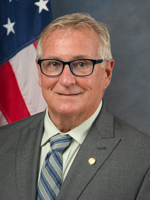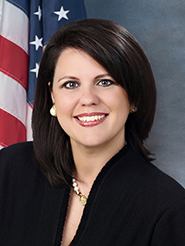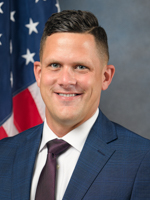To be clear, Florida’s so-called “Don’t Say Gay” bill doesn’t ban the word “gay” in public schools.
It bans “classroom disscussion about sexual orientation or gender identity in primary grade levels or in a manner that is not age-appropriate or developmentally appropriate for students,” according to the text of the bill, formally titled “Parental Rights in Education.”
Better known by the nickname assigned by its numerous critics, the bill passed the Florida House last month and the Florida Senate last week. It now awaits the signature of Gov. Ron DeSantis, and continues to draw both scorn and support from people in and beyond Florida.

As for Florida Keys legislators, State Rep. Jim Mooney voted against the bill, and State Sen. Ana Maria Rodriguez voted for it, according to legislative voting records.
According to the bill text, it precludes “classroom discussion of sexual orientation and gender identity.” It does not define “classroom discussion,” or mention sex education.

Rodriguez told the Keys Weekly, “The Parental Rights in Education bill is about protecting children. The bill says schools can’t teach sex ed and gender theory in kindergarten through third grade. Period. It has nothing to do with students saying they are gay or saying they have gay parents. That is all just flatly untrue.”
Adam Gentle, a Democrat running for the House District 120 seat, spoke against the bill at the March 7 Hometown Call for Candidates, during which he started his two-minute speech by announcing, “I’m gay.”
Gentle went on to say that schools are often the only space for LGBTQ youths to feel safe about talking about their identity. “Their ability to talk with trusted teachers and administrators is being ripped away from them,” Gentle said.

Republican State Rep. Joe Harding, of north central Florida, who sponsored the bill, has said it is “designed to keep school districts from talking about these topics before kids are ready to process them,” and “to keep parents in the know.”
The bill also forbids school employees from withholding from parents “any information about his or her student’s mental, emotional, or physical health or well-being, unless a reasonably prudent person would believe that such disclosure would result in abuse, abandonment, or neglect.” That language has been interpreted to mean that schools and teachers must inform parents of any student’s discussions about their sexual orientation or gender identity.
The bill authorizes parents to sue the school district for failure to reveal such information.
Critics argue the language is intentionally vague, and suggest that the phrase “in a manner that is not age appropriate or developmentally appropriate,” could prompt lawsuits from parents who believe any discussion of LGBT identities, at any age, is inappropriate.
Others opposed to the bill wonder what defines “classroom discussion,” and point to the potential exclusion and villification of children with same-sex parents.
“Imagine elementary school students are asked to draw pictures of their families and present them to the class,” Kara Gross, legislative director and senior policy counsel of the American Civil Liberties Union of Florida, which opposes the bill, told Time magazine in February. “What happens if a child being raised by a same-sex couples draws a picture of their two dads?”
Is a second-grader not allowed to mention his two moms in a classroom discussion about Thanksgiving traditions? What if a student’s brother has a husband the student has known since infancy? How far can the legislation go, and who will define age-appropriate discussions of sexual orientation and gender identity?
They’re questions with no concrete answers right now, and “It scares the hell out of me,” said Owen Trepanier, an urban planner in Key West, who has four children, ages 4 to 15, with his husband.
Trepanier recalled when their eldest daughter, who’s now 15, was 6 years old and attending Montessori Elementary Charter School in Key West. “Our daughter, at the time, was the only student with two dads and the only one in her class who was adopted. The kids had questions, so the teacher and the school orchestrated a visit so the class could meet her two dads. Our daughter got to tell her story from a 6-year-old perspective. After that it was never, ever an issue for her classmates. It was only a question because kids didn’t have any information.”
When it comes to the bill in question, “Little kids are going to suffer,” Trepanier said. “Because when kids don’t have an answer for something, such as why they can’t talk about their family in school, they’ll make up an answer, which usually involves blaming themselves and somehow making it their fault that they have two dads or two moms. And now we’re telling them they can’t talk about their family. The radical, right-wing parents of kids will extend the bigotry for another generation.”
The 2020 census shows there are an estimated 1.1 million households headed by same-sex couples in the United States, and 15% of those have at least one child under 18, according to census.gov. The American Association of Marriage and Family Therapists estimates that 1 to 9 million Americans have at least one gay parent.
Republican State Rep. Joe Harding, who sponsored the bill, said it’s “designed to keep school districts from talking about these topics before kids are ready to process them.”
But State Rep. Carlos Smith, an openly gay Democrat, warned his fellow legislators that it would send the wrong message to children about what it means to be a member of the LGBTQ community.During House debate on the bill, according to Newsweek on March 8, Smith said, “But members, this bill goes way beyond the text on the page. It sends a terrible message to our youth, that there is something so wrong, so inappropriate, so dangerous about this topic that we have to censor it from classroom discussion.’”



















